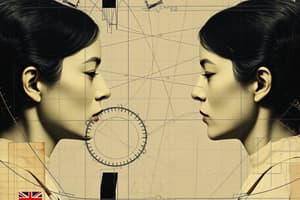Podcast
Questions and Answers
Match the following physiological measurements with their descriptions:
Match the following physiological measurements with their descriptions:
Physical conditions monitoring = Electronically measuring reaction and behavior Correlation coefficient = Degree of relationship between two variables Coincidence = Strong correlation does not imply causation Predictions = Requires more than one study for direction
Match the following statistical terms with their definitions:
Match the following statistical terms with their definitions:
Mean = The average value of a set of numbers Median = The midpoint of a data set Mode = The value that appears most frequently Standard deviation = Measure of score variability in groups
Match the following terms related to data analysis with their implications:
Match the following terms related to data analysis with their implications:
Correlation coefficient = Indicates relationship strength Coincidence = Suggests caution in interpretations Predictions = Depend on multiple studies for validation Standard deviation = Reflects distribution of data scores
Match the following statistical measures with their applications:
Match the following statistical measures with their applications:
Match the following experimental concepts with their relevance:
Match the following experimental concepts with their relevance:
Match the following sensory adaptation concepts with their definitions:
Match the following sensory adaptation concepts with their definitions:
Match the extrasensory perception terms with their definitions:
Match the extrasensory perception terms with their definitions:
Match the examples with their corresponding categories:
Match the examples with their corresponding categories:
Match the factors influencing perception with their descriptions:
Match the factors influencing perception with their descriptions:
Match the animals with their common categories:
Match the animals with their common categories:
Match the characteristics of a stimulus with their descriptions:
Match the characteristics of a stimulus with their descriptions:
Match the types of thresholds with their definitions:
Match the types of thresholds with their definitions:
Match the specialized nerves with the type of stimuli they detect:
Match the specialized nerves with the type of stimuli they detect:
Match the sensory modalities with their associated characteristics:
Match the sensory modalities with their associated characteristics:
Match the characteristics of sensation to their definitions:
Match the characteristics of sensation to their definitions:
Match the following terms with their definitions:
Match the following terms with their definitions:
Match the type of research study with its description:
Match the type of research study with its description:
Match the data gathering method with its characteristics:
Match the data gathering method with its characteristics:
Match the gathering data method with its type:
Match the gathering data method with its type:
Match the study type with its focus:
Match the study type with its focus:
Match the stages of child development with their characteristics:
Match the stages of child development with their characteristics:
Match Piaget's cognitive development stages with their descriptions:
Match Piaget's cognitive development stages with their descriptions:
Match the following psychology concepts with their definitions:
Match the following psychology concepts with their definitions:
Match the age ranges with their developmental focus:
Match the age ranges with their developmental focus:
Match the following types of biases with their descriptions:
Match the following types of biases with their descriptions:
Match the developmental milestones with their stages:
Match the developmental milestones with their stages:
Match the following examples with their related psychology concepts:
Match the following examples with their related psychology concepts:
Match the cognitive milestones with their corresponding stages:
Match the cognitive milestones with their corresponding stages:
Match the following participants selection principles with their importance:
Match the following participants selection principles with their importance:
Match the following psychological research terms with their implications:
Match the following psychological research terms with their implications:
Match the following concepts of learning with their definitions:
Match the following concepts of learning with their definitions:
Match the following techniques in behavioral modification with their descriptions:
Match the following techniques in behavioral modification with their descriptions:
Match the following key terms in learning psychology with their applications:
Match the following key terms in learning psychology with their applications:
Match the following elements of conditioning with their examples:
Match the following elements of conditioning with their examples:
Match the following Pavlov's principles with their correct descriptions:
Match the following Pavlov's principles with their correct descriptions:
Match the following types of memory problems with their descriptions:
Match the following types of memory problems with their descriptions:
Match the following types of interference with their definitions:
Match the following types of interference with their definitions:
Match the following terms related to distortion with their definitions:
Match the following terms related to distortion with their definitions:
Match the following memory processes with their characteristics:
Match the following memory processes with their characteristics:
Match the following psychological terms with their functions:
Match the following psychological terms with their functions:
Match the following types of learning with their descriptions:
Match the following types of learning with their descriptions:
Match the following concepts of reinforcement with their definitions:
Match the following concepts of reinforcement with their definitions:
Match the following concepts related to observational learning with their explanations:
Match the following concepts related to observational learning with their explanations:
Match the following influences on learning with their impact:
Match the following influences on learning with their impact:
Match the following stages of TOTE Learning with their functions:
Match the following stages of TOTE Learning with their functions:
Match the following memory processes with their descriptions:
Match the following memory processes with their descriptions:
Match the types of memory with their characteristics:
Match the types of memory with their characteristics:
Match the memory types with their duration:
Match the memory types with their duration:
Match the following short-term memory strategies with their definitions:
Match the following short-term memory strategies with their definitions:
Match the following characteristics of memory with their implications:
Match the following characteristics of memory with their implications:
Flashcards
Sensory Adaptation
Sensory Adaptation
The process where sensory receptors become less sensitive to constant stimulation.
Perception
Perception
The way we interpret sensory information, influenced by factors like attention, individual experiences, context, and expectations.
Clairvoyance
Clairvoyance
The ability to perceive information without using the five senses.
Telepathy
Telepathy
Signup and view all the flashcards
Psychokinesis
Psychokinesis
Signup and view all the flashcards
Correlation coefficient
Correlation coefficient
Signup and view all the flashcards
Coincidence
Coincidence
Signup and view all the flashcards
Median
Median
Signup and view all the flashcards
Mode
Mode
Signup and view all the flashcards
Standard deviation
Standard deviation
Signup and view all the flashcards
Variable
Variable
Signup and view all the flashcards
Dependent Variable
Dependent Variable
Signup and view all the flashcards
Independent Variable
Independent Variable
Signup and view all the flashcards
Longitudinal Study
Longitudinal Study
Signup and view all the flashcards
Cross-sectional Study
Cross-sectional Study
Signup and view all the flashcards
Difference Threshold
Difference Threshold
Signup and view all the flashcards
Absolute Threshold
Absolute Threshold
Signup and view all the flashcards
Intensity of a Stimulus
Intensity of a Stimulus
Signup and view all the flashcards
Sensation
Sensation
Signup and view all the flashcards
Stimulus
Stimulus
Signup and view all the flashcards
Sensorimotor Stage
Sensorimotor Stage
Signup and view all the flashcards
Preoperational Stage
Preoperational Stage
Signup and view all the flashcards
Concrete Operational Stage
Concrete Operational Stage
Signup and view all the flashcards
Formal Operational Stage
Formal Operational Stage
Signup and view all the flashcards
Adult Influence on Child Development
Adult Influence on Child Development
Signup and view all the flashcards
What is psychology?
What is psychology?
Signup and view all the flashcards
What is a theory?
What is a theory?
Signup and view all the flashcards
What is bias?
What is bias?
Signup and view all the flashcards
What is experimenter bias?
What is experimenter bias?
Signup and view all the flashcards
What is participant bias?
What is participant bias?
Signup and view all the flashcards
Learning
Learning
Signup and view all the flashcards
Classical Conditioning
Classical Conditioning
Signup and view all the flashcards
Extinction in Classical Conditioning
Extinction in Classical Conditioning
Signup and view all the flashcards
Operant Conditioning
Operant Conditioning
Signup and view all the flashcards
Counter-conditioning
Counter-conditioning
Signup and view all the flashcards
Reinforcement
Reinforcement
Signup and view all the flashcards
Positive Reinforcement
Positive Reinforcement
Signup and view all the flashcards
Cognitive Learning
Cognitive Learning
Signup and view all the flashcards
Observational Learning
Observational Learning
Signup and view all the flashcards
Transfer of Learning
Transfer of Learning
Signup and view all the flashcards
Anterograde Amnesia
Anterograde Amnesia
Signup and view all the flashcards
Retrograde Amnesia
Retrograde Amnesia
Signup and view all the flashcards
Proactive Interference
Proactive Interference
Signup and view all the flashcards
Retroactive Interference
Retroactive Interference
Signup and view all the flashcards
Cue-Dependent Forgetting
Cue-Dependent Forgetting
Signup and view all the flashcards
Sensory Memory
Sensory Memory
Signup and view all the flashcards
Short-Term Memory
Short-Term Memory
Signup and view all the flashcards
Rehearsal
Rehearsal
Signup and view all the flashcards
Chunking
Chunking
Signup and view all the flashcards
Long-Term Memory
Long-Term Memory
Signup and view all the flashcards
Study Notes
Learning - Laboratory Experiments
- Laboratory experiments can control certain variables.
- Physiological measurements are physically measured to see effects on the dependent variable.
- Ex: Monitor brain of someone vs a drug user.
Analyzing Collected Data
- Correlation coefficient - degree of relationship between two variables.
- Coincidence - strong correlation doesn't mean causation.
- Predictions based on correlation require more than one study to determine a relationship's direction.
Graphs and Statistics
- Control group and experimental group
- Mean - average
- Median - midpoint
- Mode - most frequent score
- Standard deviation - how different the scores are between control and experimental group.
Studying That Suits You
Use AI to generate personalized quizzes and flashcards to suit your learning preferences.




